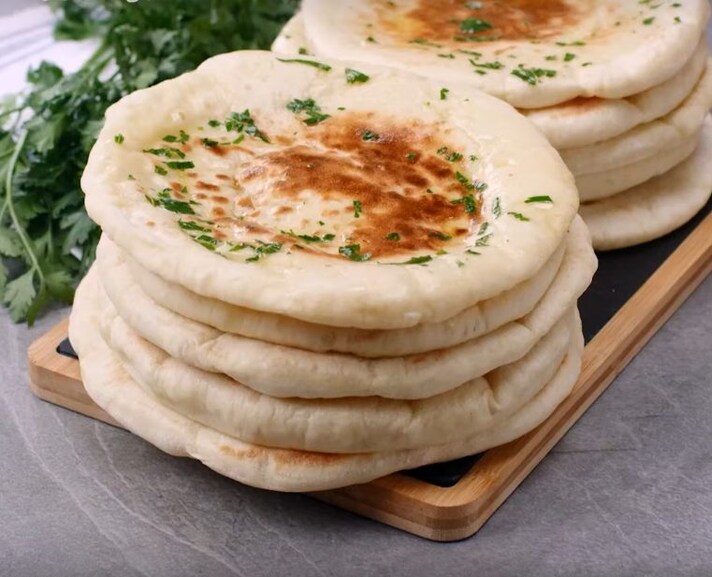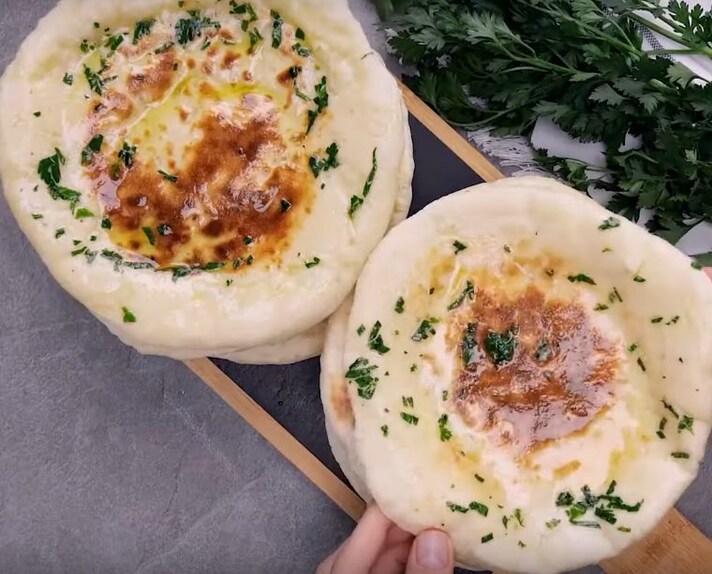
Ingredients
Babout is an easy Moroccan pita bread from Northern Africa. It’s flavorful, soft and chewy, and very much like a pita bread—which means you can stuff it with all kinds of delicious fillings.
Unlike Middle Eastern pita which is usually baked in an oven, babout is cooked on the stove or a griddle. It takes just a few minutes to puff up and create that characteristic pocket. It is this pocket that makes it perfect for sandwiches—stuff with grilled meat or enjoy it as breakfast spread with jam, cream cheese, or even chocolate spread!
So grab a few pantry staples like flour, yeast, sugar and salt, and get ready to prepare the most delicious bread you’ve ever made.

What is Batbout?
Batbout (pronounced baht-buht) is also known by other names like mkhamer, toghrift and matlou‘. The different terms refer to different ways in which each region makes their own variety.
The bread is quick and easy to make, and the result is a soft, slightly chewy bread. Perfect for sandwiches or mopping up the sauces of a flavorful curry.
Moroccan Pita Bread Ingredients
Milk – milk creates a softer bread. If you want, omit the milk and use water instead.
Sugar – this add a bits of sweetness to the dough and improves the yeast action.
Flour – make sure to use 00 durum wheat, or see our suggestions below.
Butter – use high-quality butter for the best flavor.

Tips
For a better texture, use a mixture of white, semolina, and whole wheat flour, making sure the white flour is more than half of the ratio. You can use a mixture of semolina and durum wheat and leave out the white flour completely. This will prevent gumminess.
If you feel the bread is too dry (if it breaks when making a sandwich), you can add a bit of oil to the dough.
You can leave out the milk and use warm water instead.
To ensure optimal cooking, preheat your griddle or frying pan completely. Once you start cooking the batbout, lower the heat slightly.
How To Store Batbout
Store the pita bread in an airtight container (or Ziploc bag) at room temperature for up to 3 days.
Alternatively, you can freeze them for up to 3 months.
How To Make Batbout
;Resize,width=712;)
In a large mixing bowl, add the milk, water, sugar, dry yeast, and mix to combine.
In a large mixing bowl, add the milk, water, sugar, dry yeast, and mix to combine.
;Resize,width=712;)
Add the flour, salt and stir well to combine.
Add the flour, salt and stir well to combine.
;Resize,width=712;)
Knead until the dough becomes smooth. Allow the dough rise for 2 hours.
Knead until the dough becomes smooth. Allow the dough rise for 2 hours.
;Resize,width=712;)
Work the dough with more flour and divide it into 10 balls.
Work the dough with more flour and divide it into 10 balls.
;Resize,width=712;)
Roll them out with a rolling pin into a small circle.
Roll them out with a rolling pin into a small circle.
;Resize,width=712;)
Cook them in a pan.
Cook them in a pan.
;Resize,width=712;)
Cook until golden on both sides, and puffy.
Cook until golden on both sides, and puffy.
;Resize,width=712;)
Mix together the parsley and butter.
Mix together the parsley and butter.
;Resize,width=712;)
Brush it over the bread.
Brush it over the bread.
Notes
Batbout can be made ahead of time and frozen. Reheat in the oven.

;Resize,width=767;)
